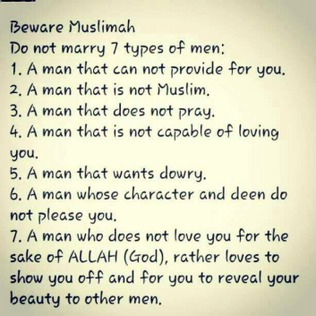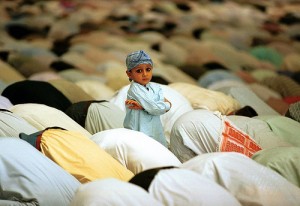|
Girl meets boy, girl likes boy, girl is Muslim, boy is not Muslim. They fall in love and want to get married….but it’s haram. Eventually, she finds a way to rationalize it in her head and finds an imam that will perform the nikkah. Girl and boy are now married and will live happily ever after. This scenario is one that is often heard, especially among Muslims in the West. The scenario if a Muslimah wanting to marry a non-Muslim. Based solely on the Qur’an and Sunnah, it is not permissible for a Muslim woman to marry a non-Muslim regardless if he is ahl-al-kitaab(People of the Book-Jews and Christians) or not. A Muslim man may marry a non-Muslim but only if she is from ahl-al-kitaab, is actually practicing and does not engage in shirk. That means that contrary to popular perception, a Muslim man cannot just marry any “Christian" woman, she has to be abiding by the rulings in her book and must not commit shirk which pretty much rules out Catholics and any others who believe in the trinity. If a Muslim man does find this woman and marries her, all kids born from the marriage must be raised Muslim and she must not bring about what is forbidden in Islam into her home. Many scholars also add that it is not recommended for Muslim men to marry non-Muslims in the west because that results in Muslimahs not having someone to marry. So back to the scenario that I presented earlier. Though the imam performed the nikkah(marriage contract) it is not valid under the eyes of Allah(SWT). The couple might consider themselves married but Islamically they are not. That means that any carnal interactions that they have will be considered zina(fornication) and any kids borne of the marriage will belong to the bed. Often times, we Muslims are of the opinion that the permission or ruling of an imam is always correct and supersedes the rulings of Allah(SWT). This is wrong(unless of course you’re into the whole infallible imam thing). Just because an imam says something is okay or halal does not make it so. I've seen imams who condone domestic violence, imams who tell their congregation that saying “bismillah” on non-zabiha meat makes it halal, and imams who think its okay to lead salah late because of his discretion. None of these things are okay under the banner of Islam. Allah(SWT) says: A man slave who believes is better than an unbeliever, even though if he attracts you. Unbelievers do (but) beckon you to the fire but Allah beckons by His grace to the garden (of bliss) and forgiveness, and makes His signs clear to mankind; that they may receive admonition” Qur'an 2:222
0 Comments
Recite what has been revealed to you of the Book and establish salat. Salat precludes indecency and wrongdoing. And remembrance of Allah is greater still. Allah knows what you do.” (Quran 29:45) As we all know, Muslims are obligated to pray five times a day and there are very few exceptions to this obligation. To not perform all prayers during their prescribed time is a grave sin that you will have to answer for on the Day of Judgement. Along with our five mandatory prayers, the Prophet(SAW) was known to also pray extra prayers which we have come to know as "Sunnah salah" these prayers are in addition to the five that we already have to do and more blessings are earned for praying them.
Whenever I'm engaging in a conversation with someone about the importance of prayer a common question is "why is the prayer so formatted? Why can't someone just sit down and pray to God?" I think this questions stems mainly from our understanding of what prayer is. In Islam, the prayers that we engage in five times a day are called "salah" which are referred to as ritualistic prayers. These prayers come with their prescribed sayings and movements and must be done in the proper manner. In Islam, we also have the concept of "dua" which is most often referred to as "supplications". This is when we simply sit down and ask/tell Allah what we want. Salah has been ordained upon us for numerous reasons. This first and foremost reason is that it is a sort of test, a way to gauge our obedience and submission to our creator. Allah(SWT) is asking us to wake up from our sleep, pause whatever work we're doing, turn off our favorite tv show to worship him. He's testing us by seeing if we will truly disengage from our worldly affairs and worship him. Salah also gives us a chance to connect with Him and His word. During our busy day, He is giving us an opportunity to stop at least five times to just remember Him, to talk to Him, to connect with Him. The Prophet(SAW) tells us that “When any one of you stands to pray, he is communicating with his Lord, so let him pay attention to how he speaks to Him.” as well as that “The closest a person is to His Lord is when he is in prostration” Observing our salah helps to build a closer and better relationship with our creator. By enjoining the act of salah upon us, Allah(SWT) is also giving us the opportunity to remember him and remember his guidance and mercy. Seventeen times a day(the amount of rakat total in the 5 prayers) we recite Surah Al-Fatiha. That means that 17 times every day, we remember through our recitations that Allah is merciful, that He is The Master of the Day of Judgement, that He is The most compassionate. Seventeen times a day we make dua to Him to help us stay on the straight path. Simply by stopping what we are doing five times a day for no more than 10-15 minutes, we are able to engage in such a rewarding practice. Salah is also important because it guards us from evil and helps us stay away from sins. When we make salah we are seeking Allah’s help and protection. We are asking him to protect us from the temptations of Shaytan and assist us in remaining steadfast. Observing salah protects us from committing sins because if one is sincere in their salah, they will most likely not finish their salah and then go engage in haraam activities. Alongside this, if one is engaging in haraam behaviour and still values their salah, stopping to pray removes them from sinful situations. |
IntroductionAs humans in this dunya we are inundated by many distractions, misguidance, and falsehoods therefore making life much more confusing and difficult. What are we thinking, saying, observing, and experiencing in our lives? Are we truly living by Islamic ideals? This is where we can choose to actively “Strive For Clarity.” Archives
April 2023
Categories
All
|
 RSS Feed
RSS Feed

